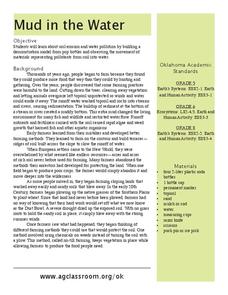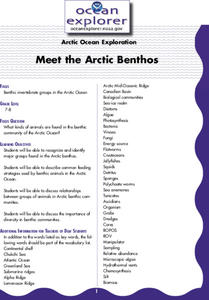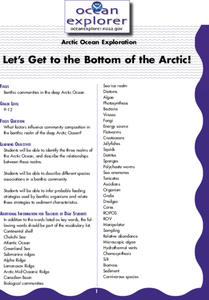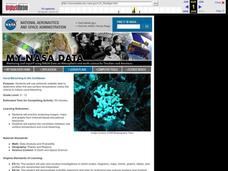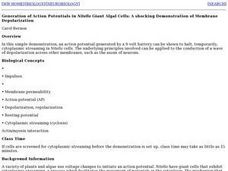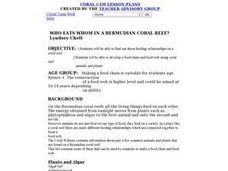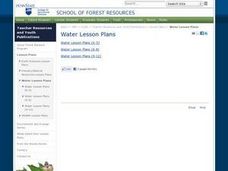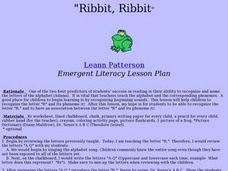Curated OER
Mud in the Water
Sixth graders investigate erosion. In this erosion instructional activity, 6th graders explore how farming changes the environment. Students construct an erosion model and research ways to protect the soil from excess mud generated by...
Curated OER
An Introduction to 'Opae 'ula
Students examine the 'opae 'ula. In this science lesson, students observe a live specimen and identify the major body parts. Students construct habitat jars and observe the 'opae 'ula behaviors.
Curated OER
What Is A Plant?
Students explore plants. In this plant activity, students examine organisms to determine which are plants. During this introductory activity, students explore characteristics of living things.
Curated OER
Ocean Grazers Conclusion
Students research an ocean species. For this science lesson, students create a research presentation as a conclusion to the ocean grazers unit. Students present their projects to the class and complete a self-reflection paper.
Curated OER
Fertilizers
Students examine the nutrient makeup in fertilizers. In this plant nutrient instructional activity students see the effects of common fertilizers on plants.
Curated OER
Chloroplasts
Students study chloroplasts, their structure and evolution. In this photosynthesis lesson students experiment with polarized light and the production of chlorophyll.
Curated OER
Factors Affecting Plant Growth
Students determine the physical and chemical factors that affect plant growth. In this biology lesson, students explain the role of hormones in plants. They investigate how competition with other plants affect their growth.
Curated OER
Ocean Market
Students research how: The ocean is the source of many materials, from ores mined from its depths to relaxing mineral salts for a bath. Exquisite mother-of-pearl inlay, decorative shells, and pearl jewelry are found in gift shops...
Curated OER
Dissolved Oxygen Lesson
Students investigate what dissolved oxygen is and why it is important to aquatic life and what factors influence levels of dissolved oxygen in a lake. They study how to use MS Excel to make charts to show trends and correlations.
Curated OER
Who Can Harvest A Walleye?
Seventh graders investigate the concept of how an ecosystem is put together while conducting research using a variety of resources. They correctly differentiate between a herbivore and carnivore by placing them in the order of hierarchy...
Curated OER
Meet the Arctic Benthos
Young scholars recognize and identify major groups found in the Arctic benthos. They describe common feeding strategies used by benthic animals in the Arctic Ocean. They discuss relationships between
Curated OER
Let's Get to the Bottom of the Arctic!
Students identify the three realms of the Arctic Ocean, and describe the relationships between these realms. They describe different species associations in a benthic community.
Curated OER
Coral Bleaching in the Caribbean
Students use authentic satellite data on the NASA website to determine when the sea surface temperature meets the criteria to induce coral bleaching.
Curated OER
Odyssey of Life, Part II-The Unknown World
Students complete an experiment in which they observe different natural sample in which they uncover the microbial world. They complete a two part worksheet that accompanies the lesson.
Curated OER
Generation of Action Potentials in Nitella Giant Algal Cells
Students observe cytoplasmic streaming in Nitella cells. They examine the conduction of a wave of depolarization across other membranes, such as the axons of neurons. Students predict the effects of sending a small electric current...
Curated OER
State Of The Bay
Students investigate the environmental problems that surround the Chesapeake Bay area. They use an environmental handout as a resource that should be supplemented with research. Also students ask specific questions to report findings and...
Curated OER
Plant Life
Seventh graders examine different categories of plant life and their roles as producers of food and oxygen for other organisms. They study the evolution of plants from simple organisms to very complex ones. They look at the different...
Curated OER
Brine Shrimp Feeding
Third graders study the diet of the brine shrimp. This is an introduction to a math measurement of a micrometer because of the size of the food brine shrimp feed upon. They make predictions about the types of food shrimp eat based on...
Curated OER
Who Eats Whom in a Bermudian Coral Reef?
Students will be able to find out about feeding relationships on a coral reef. They then will be able to develop a food chain and food web using coral reef animals and plants using the Coral Website.
Curated OER
Snow on Sea Ice
Students examine different samples of ice and predict the amount of snow that has fallen in a given year. Using a calculator, they graph the various thicknesses. They analyze the graphs to determine the relationship between the snow and...
Curated OER
Water Quality Monitoring
Pupils comprehend the four parameters of water quality. They perform tests for salinity, dissolved oxygen, pH and clarity or turbidity. Students comprehend why scientists and environmental managers monitor water uality and aquatic...
Curated OER
"Pennsylvania Watersheds, Many Ways to the Sea"
Students trace a molecule of water through the water cycle including each of its three loops. They describe why evapotranspiration demands the largest portion of total precipitation falling on a forested watershed.
Curated OER
Ribbit! Ribbit!
Students research a frog's life cycle and habitat using books, the Internet and lecture. Students make origami frogs, write letters to Toad from Arnold Lobel's "Frog and Toad" and participate in a simulated camouflage activity.
Other popular searches
- Algae. Phytoplankton
- Algae Growth
- Coralline Algae
- Algae Cells
- Marine Algae
- Red Algae
- Corals and Algae
- Algae Blooms
- Multicellular Algae
- Blue Green Algae
- Phosphate Algae Detergents
- Green Algae


